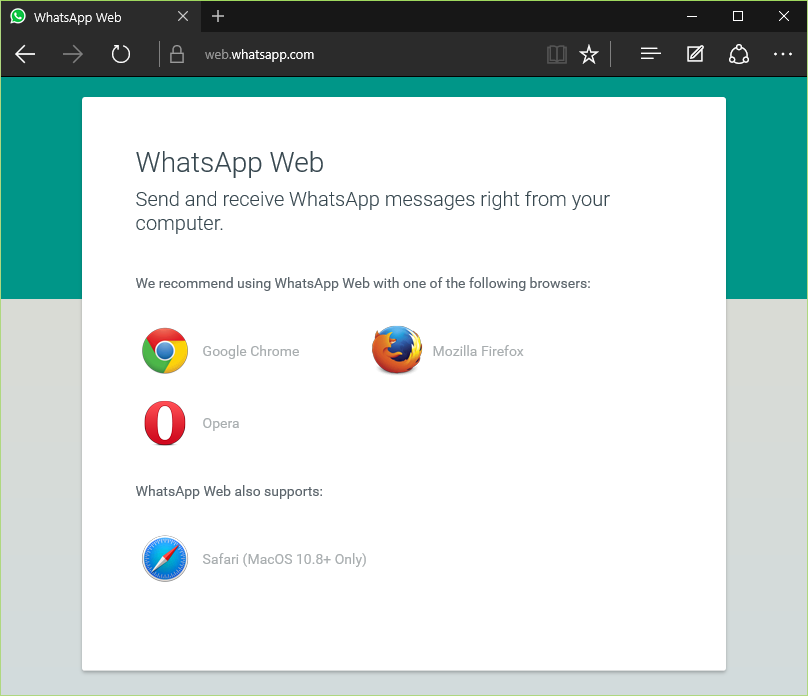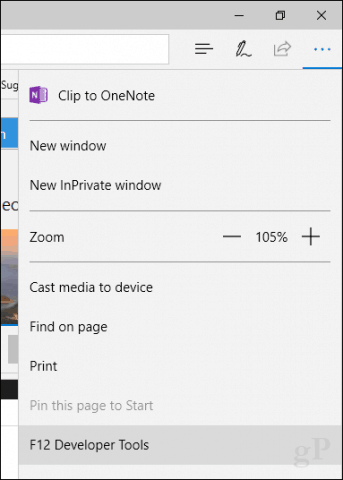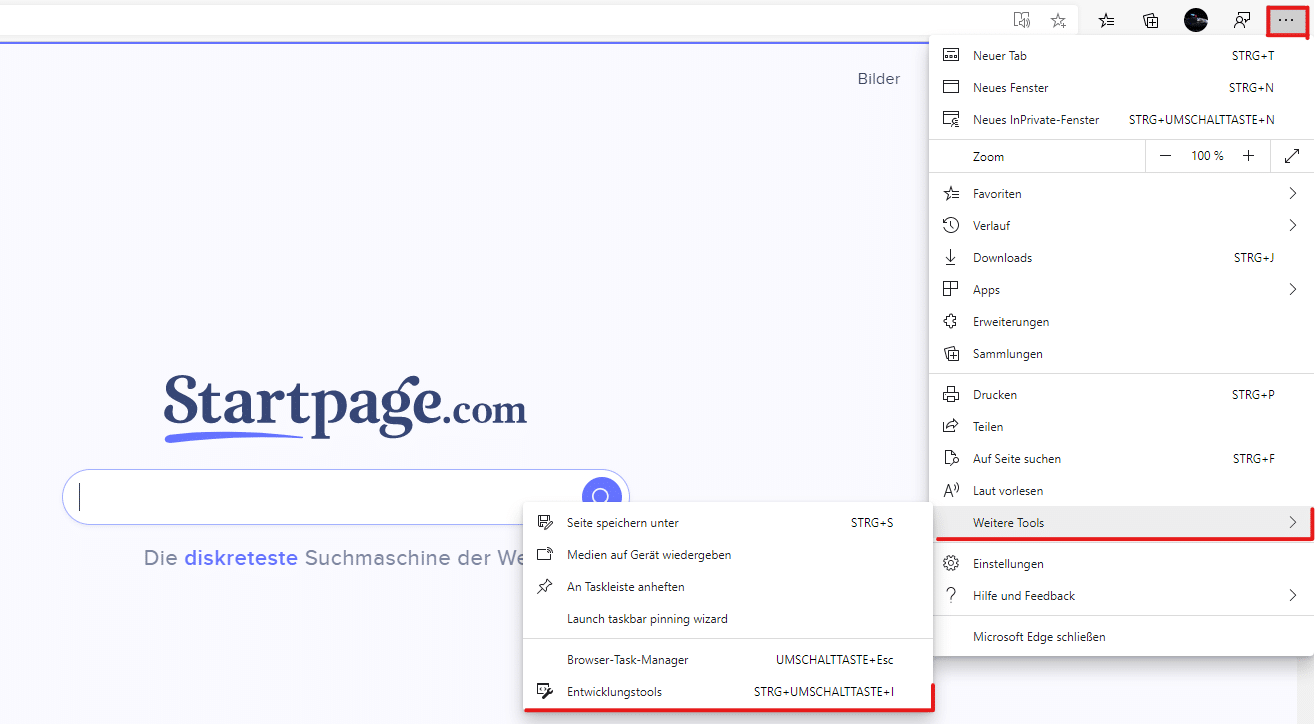Switch between popular user-agent strings quickly and easily. With this extension, you are able to set a user agent for a specific tab, or a specific domain. Popular browser user agents like safari from iPhone, iPad are easily selectable, with that you may browse certain website as if you are on a mobile device, like twitter.com, youtube.com etc. More Avant Browser user agents strings - Beonex Mozilla based browser, sibling of Netscape 7. Beonex Communicator contains-Navigator - web-browser-Mailnews - email/news client-Composer - web page editor available for Windows, Linux, MacOs, FreeBSD Click on any string to get more details Beonex 0.8.2-stable. Why do you think Microsoft Edge thinks its Chrome? From the evidence your provided its the completely opposite. If you think that your user agent is not correctly reporting the correct browser then you should check it by whatsmyuseragent.com or a similar service. Edge is new, expect websites to get confused. – Simon Hayter ♦ Aug 7 '15 at 9:50. There are several ways you can access the developer tools in Edge. The quickest way is to press F12 on your keyboard. Another way is from the More actions menu F12 Developer Tools.
- Edge Browser User Agent
- Detect Edge Browser User Agent
- Edge Browser User Agent String
- Edge Browser User Agent Switcher
- New Microsoft Edge User Agent
The standard way to pass information to the server about the visiting device is to include it in the User-Agent (UA) string. This information typically passes the name and version of the browser among many other details. In order to get an understanding of which mobile browsers use your site, you need to know their User-Agent strings.


Here’s a handy list of UAs that you may want to use.
What is the User-Agent and what information does it pass?
Described in the HTTP standard, the User-Agent string contains a number of tokens that refer to various aspects of the request, including the browser’s name and version, rendering engine, device’s model number, operating system and its version, etc.
From a web developer’s perspective, User-Agent strings can be useful when it comes to testing how online content is rendered on various hardware and software combinations. What works well on Chrome Mobile and the latest Android may not work the same on an older device and browser.
Most common mobile browsers
The landscape of mobile browsers is quite complex, with several major players (pre-installed in most cases) and a number of locally popular contenders. While all phones come with pre-installed browsers, both Google Play and Apple App Store offer a number of alternative browsers, some focusing on speed and lightness, others on saving bandwidth and blocking ads, and an ever-increasing amount claiming to increase privacy and reduce a users' mobile digital footprint. Vmware workstation for mac os torrent. (We discussed some of the more popular privacy-respecting browsers.)
According to our report on the most popular mobile browsers, Safari Mobile, Chrome Mobile, and Samsung Browser are the three most used mobile browsers across the globe. The report also lists a number of other locally popular apps for web browsing, such as UC Browser, Yandex Browser, IE Mobile, Opera Mobile, Opera Mini, Firefox, and MIUI Browser. Feel free to browse the stats for your local market using our Data Explorer tool.
The Complete Guide To User Agents. Nyx lip dupes for mac.
Download our free e-book on User Agents to learn:
- What is a User Agent?
- How do you parse them?
- What can you do with them?
List of mobile browsers User-Agent strings
The following table contains User-Agent strings for all the most used mobile browsers today. Note that UAs used by mobile browsers vary depending on the browser version, device model, OS, and many other factors.
Safari for iOS |
|---|
| Mozilla/5.0 (iPhone; CPU iPhone OS 10_3_1 like Mac OS X) AppleWebKit/603.1.30 (KHTML, like Gecko) Version/10.0 Mobile/14E304 Safari/602.1 |
Android Browser |
|---|
| Mozilla/5.0 (Linux; U; Android 4.4.2; en-us; SCH-I535 Build/KOT49H) AppleWebKit/534.30 (KHTML, like Gecko) Version/4.0 Mobile Safari/534.30 |
Chrome Mobile |
|---|
| Mozilla/5.0 (Linux; Android 7.0; SM-G930V Build/NRD90M) AppleWebKit/537.36 (KHTML, like Gecko) Chrome/59.0.3071.125 Mobile Safari/537.36 |
Opera Mobile (Blink rendering engine) |
|---|
| Mozilla/5.0 (Linux; Android 7.0; SM-A310F Build/NRD90M) AppleWebKit/537.36 (KHTML, like Gecko) Chrome/55.0.2883.91 Mobile Safari/537.36 OPR/42.7.2246.114996 |
Opera Mobile (Presto rendering engine) |
|---|
| Opera/9.80 (Android 4.1.2; Linux; Opera Mobi/ADR-1305251841) Presto/2.11.355 Version/12.10 |
Opera Mini |
|---|
| Opera/9.80 (J2ME/MIDP; Opera Mini/5.1.21214/28.2725; U; ru) Presto/2.8.119 Version/11.10 |
Opera Mini (iOS WebKit) |
|---|
| Mozilla/5.0 (iPhone; CPU iPhone OS 7_1_2 like Mac OS X) AppleWebKit/537.51.2 (KHTML, like Gecko) OPiOS/10.2.0.93022 Mobile/11D257 Safari/9537.53 |
Firefox for Android |
|---|
| Mozilla/5.0 (Android 7.0; Mobile; rv:54.0) Gecko/54.0 Firefox/54.0 |
Firefox for iOS |
|---|
| Mozilla/5.0 (iPhone; CPU iPhone OS 10_3_2 like Mac OS X) AppleWebKit/603.2.4 (KHTML, like Gecko) FxiOS/7.5b3349 Mobile/14F89 Safari/603.2.4 |
UC Browser |
|---|
| Mozilla/5.0 (Linux; U; Android 7.0; en-US; SM-G935F Build/NRD90M) AppleWebKit/534.30 (KHTML, like Gecko) Version/4.0 UCBrowser/11.3.8.976 U3/0.8.0 Mobile Safari/534.30' |
Dolphin |
|---|
| Mozilla/5.0 (Linux; Android 6.0.1; SM-G920V Build/MMB29K) AppleWebKit/537.36 (KHTML, like Gecko) Chrome/52.0.2743.98 Mobile Safari/537.36 |
Puffin for Android |
|---|
| Mozilla/5.0 (Linux; Android 5.1.1; SM-N750K Build/LMY47X; ko-kr) AppleWebKit/537.36 (KHTML, like Gecko) Chrome/42.0.2311.135 Mobile Safari/537.36 Puffin/6.0.8.15804AP |
Puffin for iOS |
|---|
| Mozilla/5.0 (Linux; Android 5.1.1; SM-N750K Build/LMY47X; ko-kr) AppleWebKit/537.36 (KHTML, like Gecko) Chrome/42.0.2311.135 Mobile Safari/537.36 Puffin/6.0.8.15804AP |
Samsung Browser |
|---|
| Mozilla/5.0 (Linux; Android 7.0; SAMSUNG SM-G955U Build/NRD90M) AppleWebKit/537.36 (KHTML, like Gecko) SamsungBrowser/5.4 Chrome/51.0.2704.106 Mobile Safari/537.36 |
Yandex Browser |
|---|
| Mozilla/5.0 (Linux; Android 6.0; Lenovo K50a40 Build/MRA58K) AppleWebKit/537.36 (KHTML, like Gecko) Chrome/57.0.2987.137 YaBrowser/17.4.1.352.00 Mobile Safari/537.36 |
MIUI Browser |
|---|
| Mozilla/5.0 (Linux; U; Android 7.0; en-us; MI 5 Build/NRD90M) AppleWebKit/537.36 (KHTML, like Gecko) Version/4.0 Chrome/53.0.2785.146 Mobile Safari/537.36 XiaoMi/MiuiBrowser/9.0.3 |
IE Mobile |
|---|
| Mozilla/5.0 (compatible; MSIE 10.0; Windows Phone 8.0; Trident/6.0; IEMobile/10.0; ARM; Touch; Microsoft; Lumia 950) |
Edge Mobile |
|---|
| Mozilla/5.0 (Windows Phone 10.0; Android 6.0.1; Microsoft; Lumia 950) AppleWebKit/537.36 (KHTML, like Gecko) Chrome/52.0.2743.116 Mobile Safari/537.36 Edge/15.14977 |
BlackBerry Browser |
|---|
| Mozilla/5.0 (BB10; Kbd) AppleWebKit/537.35+ (KHTML, like Gecko) Version/10.3.3.2205 Mobile Safari/537.35+ |
Get access to a free, fully-working local version trial of DeviceAtlas.
Our high performance flagship product - the most complete data set.
How to parse User-Agent strings
As you can easily notice from the list above, each User-Agent string contains a number of keywords that may obfuscate the device behind the request. For example, most UAs listed here include 'Mozilla' and 'Mobile Safari.'
Edge Browser User Agent
The result is that UA parsing solutions must be sophisticated enough to understand which elements of a UA are meaningful. A simple regex solution searching for keywords will struggle in terms of accuracy and detection speed. To make things worse, the number of UA combinations grows every time a new device, browser, browser's version, or OS version are released.
To tackle these issues you may want to consider using a specialized device detection provider, such as DeviceAtlas. It offers a patented algorithm that detects and identifies all devices requesting online content through parsing UA strings based on a constantly updated, massive list of connected devices.
Learn more about User-Agents
If you're looking for more information on User-Agents, be sure to read these posts on the DeviceAtlas blog:
Get started with a local device detection trial
DeviceAtlas is a high-speed device detection solution used by some of the largest companies in the online space to:
- Optimize UX and conversion rate on mobile
- Boost web performance
- Target ads and analyze web traffic
- Enable App analytics and advertising insights

Get started with a locally-installed trial to test DeviceAtlas at no cost.
-->By default, Windows Integrated Authentication (WIA) is enabled in Active Directory Federation Services (AD FS) in Windows Server 2012 R2 for authentication requests that occur within the organization's internal network (intranet) for any application that uses a browser for its authentication. Vue xstream for mac torrent.
AD FS 2016 now has an improved default setting that enables the Edge browser to do WIA while not also (incorrectly) catching Windows Phone as well:
The above means you no longer have to configure individual user agent strings to support common Edge scenarios, even though they are updated quite often.
For other browsers, configure the AD FS property WiaSupportedUserAgents to add the required values based on the browsers you are using. You can use the procedures below.
Detect Edge Browser User Agent
View WIASupportedUserAgent settings
The WIASupportedUserAgents defines the user agents which support WIA. AD FS analyzes the user agent string when performing logins in a browser or browser control.
You can view the current settings using the following PowerShell example:
Change WIASupportedUserAgent settings
By default, a new AD FS installation has a set of user agent string matches created. However, these may be out of date based on changes to browsers and devices. Particularly, Windows devices have similar user agent strings with minor variations in the tokens. The following Windows PowerShell example provides the best guidance for the current set of devices that are on the market today that support seamless WIA:
If you have AD FS on Windows Server 2012 R2 or earlier:
Edge Browser User Agent String
If you have AD FS on Windows Server 2016 or later:
Edge Browser User Agent Switcher
The command above will ensure that AD FS only covers the following use cases for WIA:
| User Agents | Use cases |
|---|---|
| MSIE 6.0 | IE 6.0 |
| MSIE 7.0; Windows NT | IE 7, IE in intranet zone. The 'Windows NT' fragment is sent by desktop operation system. |
| MSIE 8.0 | IE 8.0 (no devices send this, so need to make more specific) |
| MSIE 9.0 | IE 9.0 (no devices send this, so no need to make this more specific) |
| MSIE 10.0; Windows NT 6 | IE 10.0 for Windows XP and newer versions of desktop operating system Windows Phone 8.0 devices (with preference set to mobile) are excluded because they send User-Agent: Mozilla/5.0 (compatible; MSIE 10.0; Windows Phone 8.0; Trident/6.0; IEMobile/10.0; ARM; Touch; NOKIA; Lumia 920) |
| Windows NT 6.3; Trident/7.0 Windows NT 6.3; Win64; x64; Trident/7.0 Windows NT 6.3; WOW64; Trident/7.0 | Windows 8.1 desktop operating system, different platforms |
| Windows NT 6.2; Trident/7.0 Windows NT 6.2; Win64; x64; Trident/7.0 Windows NT 6.2; WOW64; Trident/7.0 | Windows 8 desktop operating system, different platforms |
| Windows NT 6.1; Trident/7.0 Windows NT 6.1; Win64; x64; Trident/7.0 Windows NT 6.1; WOW64; Trident/7.0 | Windows 7 desktop operating system, different platforms |
| Edg/ and Edge/ | Microsoft Edge (Chromium) for Windows Server 2012 R2 or earlier |
| =~Windowss*NT.Edg. | Microsoft Edge (Chromium) for Windows Server 2016 or later |
| MSIPC | Microsoft Information Protection and Control Client |
| Windows Rights Management Client | Windows Rights Management Client |
New Microsoft Edge User Agent
Additional links
